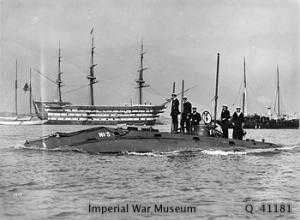HMS Holland 3
 Holland 3 at Portsmouth in September 1902, with HMS Victory in the background | |
| Career | |
|---|---|
| Name: | Holland 3 |
| Builder: | Vickers Maxim shipyard in Barrow-in-Furness |
| Laid down: | 4 February 1901 |
| Launched: | 9 May 1902 |
| Commissioned: | 1 August 1902 |
| Fate: | sank in trials in 1911 |
| General characteristics | |
| Type: | Submarine |
| Displacement: | 105 long tons (107 t) submerged |
| Length: | 63 ft 10 in (19.46 m)[1] |
| Beam: | 11 ft 9 in (3.58 m)[1] |
| Propulsion: | Petrol engine, 160 hp (119 kW) Electric motor, 70 hp (52 kW) |
| Speed: | 7 knots (8.1 mph; 13 km/h) submerged |
| Range: | 20 nmi (37 km) at 7 kn (8.1 mph; 13 km/h) submerged |
| Test depth: | 100 ft (30 m) |
| Complement: | 8 (Lieutenant, Sub-Lieutenant, Coxswain, Torpedo Instructor, Chief Engineering Artificer, Leading Stoker, Stoker, Leading Seaman and Able Seaman) |
| Armament: | • 1 × 18-inch (450-mm) torpedo tube • up to 3 torpedoes |
Holland 3 was a Royal Navy submarine launched on 9 May 1902. The submarine was designed by Vickers at Barrow-in-Furness and was laid down on 4 February 1901. The submarine was commissioned on 1 August 1902. Holland 3 sank in trials in 1911 and was then sold on 7 October 1913.
Service history
Along with Holland 5, she was one of the first two submarines to be accepted into Royal Navy service on 19 January 1903.[2] However, by the time she was launched she was already considered obsolete and thirteen A class submarines had already been ordered.[3]
References
- ↑ 1.0 1.1 Hutchinson, Robert (2001). Submarines War Beneath the Waves From 1776 to the present day. HarperCollinsPublishers. pp. 25–27. ISBN 0-00-765333-6.
- ↑ "Holland 5 Submarine". Nautical Archaeology Society. Retrieved 20 January 2012.
- ↑ McCartney, Innes (2008). Lost Patrols: Submarine Wrecks of the English Channel. Penzance: Periscope. pp. 135–136. ISBN 978-1-904381-04-4.
External links
| ||||||||||